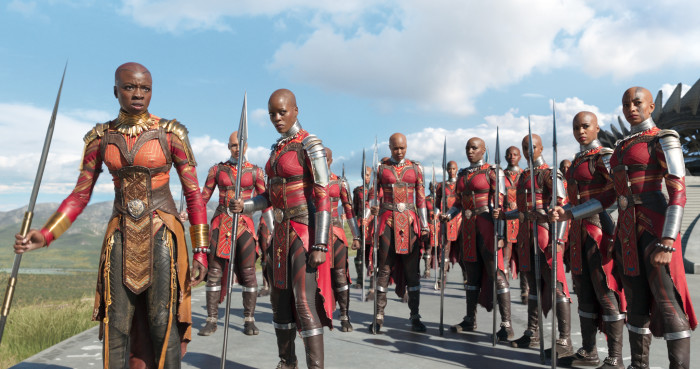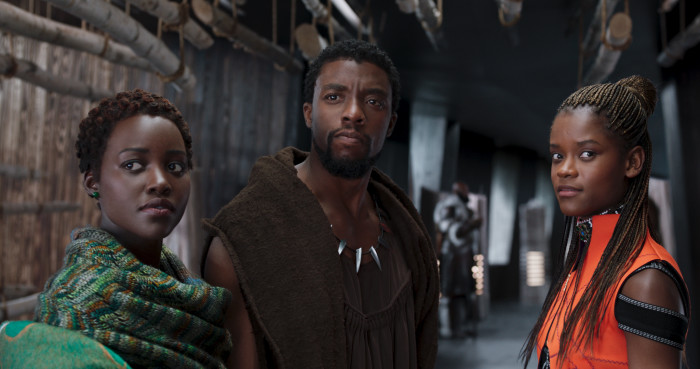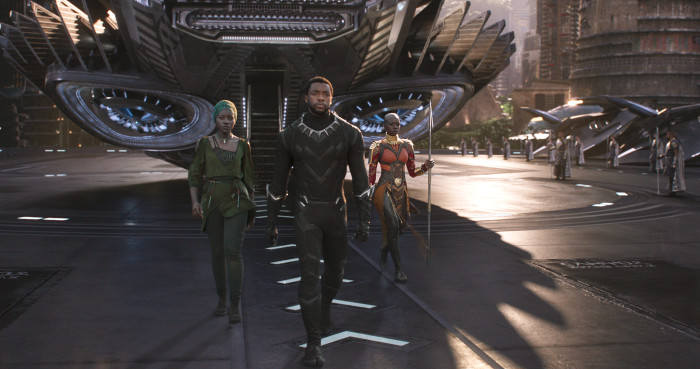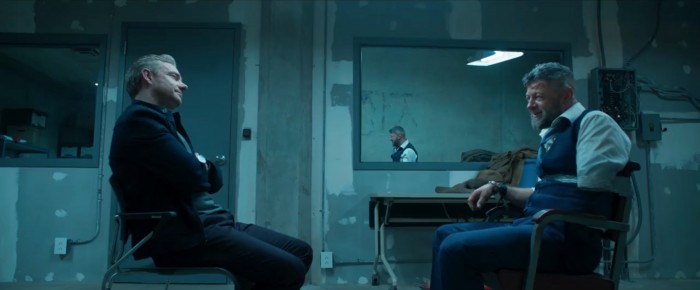Marvel's 'Black Panther' Junket Highlighted The Film's Amazing Women
Yesterday, I had the chance to attend Marvel Studios' Black Panther junket in Beverly Hills. We've already featured one article from one of the interviews I conducted while I was there, and more are on the way, but in the meantime, I wanted to share some of the highlights from the press conference that featured all of the key cast members, producer Kevin Feige, and writer/director Ryan Coogler.
Traditionally, press conferences like these can feel pretty by-the-numbers. The questions from the assembled reporters tend to be boring things like "If you could play any other Marvel superhero, who would it be?" But this one was notable for the way Coogler and his cast spoke about the female perspective and impact on this film, and I thought what they said was worth sharing.
The Women of Wakanda
Black Panther treats its female characters better than any other Marvel movie, hands down. They're independent but not "strong female characters" in the typical Hollywood sense, sexy but never sexualized, and perhaps most importantly, they all feel like actual people with their own lives and agency instead of serving as a plot point for male characters. (Some Marvel films have been better at this than others, but Black Panther sets a new high bar.)
During the press conference, the cast and director spoke about the movie's depiction of women:
Danai Gurira (Okoye): "When Ryan sat me down and talked to me about his vision and the story and the characters and the women, I was just floored. Because you don't actually get to hear that often...and then it embodied with us being on the continent, women from the continent, but very developed, very complex. It was amazing. This was something that was like, 'I just want to watch it. I get to be in it? I just want to watch this!' It was amazing, the idea of the Dora Milaje, the whole concept of them and to see them come to life. And these astounding women who I started training with one by one. I was the first one to get my head shaved. And in theory, it sounds amazing. But then you get there...and you're like, 'That's happening today?!' And it happened, and you go into the restroom to wash your hands, and you look up and you're like, 'What the –!' It took me a few days. And then all of the girls start coming in, and they've all been balded, and then the pride started to grow. This pride, and this embracing of this symbol of power in these women and the beauty of how he wrote that moment – I love that moment where she doesn't want a wig. She doesn't want it covered. Her joy and her pride is walking in with her bald head with that tattoo on it. That's so subversive, and so subversive in the right way – to say, 'That's not necessarily beauty. You don't have to have hair to be beautiful.'"
Letitia Wright (Shuri): "How it was written is that the men are always behind the women as well, so no one is undermining them. They're not like, 'You shouldn't be in technology, and you shouldn't be in math.' They're like, 'No, go ahead.' T'Challa's like, 'Go ahead, sis. This is your department, this is your domain. Kill it. I'm going to work with you to finalize it.' Because he's dope...that's the mentality of the king, and that's brilliant."
Chadwick Boseman (T'Challa/Black Panther): "I want to speak to that for a minute. I think when you talk about what Wakanda is and what it would have to be in order to progress to the place [it is in the movie], even though we're talking about a fantasy, the idea of an unconquered nation that has not been tampered with by the various means that it would have been tampered with. The idea of the next generation being smarter, being better than you is a concept that they would have evolved to. Even though we're in the same generation – she's my younger sister – she benefits from what I have reached. So you want your sons and daughters to be better than you were. That concept is a Wakandan concept. My older siblings, they raised me...you see the genius that is inside the people that come after you, and if you have an ancestral ground, they're looking at you like, 'I know you're looking up to me, but we're looking up to you.' That's an African concept."
Angela Bassett (Ramonda): "[I was] extraordinarily [proud] and so pleased that this story, written by Ryan and Joe Robert Cole, and [that] Marvel supported that. In African culture, they feel as if there is no king without a queen, and I think in this story, it highlights the queen. The warrior. The general. The young sister. So I was so proud to have my daughter and my son [at the premiere] last night because in their faces and in their spirit, they were feeling themselves. They stood taller after last night."
Lupita Nyong'o (Nakia): "What I love about the way this film represents women is that each and every one of us is an individual, unique, and we all have our own sets of power and our own agency. We hold our own space without being pitted against each other. I think that's a very, very powerful message to send to children, both male and female. I think oftentimes in movies, we fall into that trap where women – there's very few of us, and then we are against each other. There's a competitive spirit. This film freezes all that. We see women going about their business, and supporting each other and even arguing with each other. Having different points of view, but still not being against each other. I think that's extremely important. In so doing, the fact that in this film there's so many of us, we really get a sense of the fabric of Wakanda as a nation. We see women alongside men and we see how much more effective a society can be if they allow women to explore their full potential."
Ryan Coogler: "Just to add to that, speaking for some of the folks who were involved with the film that aren't here. This film evolved from brilliant women all over, from start to finish. As I said, Kevin runs the studio, but he does it with his right and left hand. His right hand is Louis D'Esposito, and his left hand is Victoria Alonso, who is amazing. She was there from day one. Our crew was just [full] of women who were hired because they were the best person for the job. They weren't hired because they were women, they were hired because they were the best for the job. That was our cinematographer Rachel Morrison, our costume designer Ruth Carter, our production designer Hannah Beachler, and our first assistant director, who was responsible for getting everything going, Lisa Satriano. In post-production, this film was edited by Michael Shawver and Debbie Berman, who's from South Africa, and finished by Victoria Alonso. Throughout that process, it was a constant thing – we'd be in a script meeting and Victoria would raise her hand sometimes and be like, 'Yo, I don't think that should happen.' And we were like, 'OK!' (laughs) You maybe zig where you should have zagged, and working with these amazing women, I was incredibly blessed to have these people, to have that perspective, to have their fingerprints all over it. That presence is – what is it, over half of the population? It was there constantly, and there in full effect."
A More Personal Marvel Movie
Marvel told the director to make Black Panther even more personal:
Ryan Coogler: "You think of Marvel like this big studio, like the biggest studio in the world right now, but it's really just Kevin and his two friends. (laughs) It's these two really smart people, Louis D'Esposito and Victoria Alonso, and on this film, there was [executive producer] Nate [Moore]. And they're all very different people, and Kevin is kind of at the head of this. I told him, 'I want to make a film that works on every level that you guys normally work on, and I want to make it with these themes. I kind of had these themes in mind.' And he was like, 'Great. Let's go.' I didn't expect that. But as I got to know these guys, specifically Kevin, it's what he's all about. He's all about making something that works as a piece of entertainment, but leaves you with something to think about. He was very encouraging. I was getting notes when we were working on this like, 'Make it more specific. Make it more personal.'"
A More Political Marvel Movie
On the film's thematic relevance to current events:
Kevin Feige: "Ryan wrote this, for the most part, a year and a half ago or two years ago. So things have happened in the world which makes the film seem more relevant. There are other things in the film that have been relevant for centuries. But the truth of the matter is, Stan Lee and Jack Kirby and the whole Marvel bullpen created Wakanda and created T'Challa and created Black Panther and made him a smarter, more accomplished character than any of the other white characters in the mid-1960s. So if they had the guts to do that in the mid-1960s, the least we can do is live up to that and allow this story to be told in the way it needs to be told and not shy away from things that the Marvel founders didn't shy away from in the height of the Civil Rights era."
Danai Gurira: "I think what was really fascinating and almost very emotional for me, being that I'm Zimbabwean and American, that's something you always want. You see the power and potential of where you're from, but you see how skewed it's viewed by the world, and how misrepresented it is, and how distorted it's received by the world so often. So it's kind of the salve to those wounds to see this world brought to life this way, and to see all the potential and power of all the different African culturalisms and aspects of our being that were celebrated. It's so different – it subverts things we've been seeing forever around the continent. We see, when we're there, we see beauty, power, potential, ability, resources – but they're never exhibited. And to put that on a Marvel epic scale of exhibition it really salves wounds in a really deep way."
The Token White Guys
On being the two white guys in the cast:
Andy Serkis: "We were about to do our scene. Ryan came up to us and said, 'You know, I've never actually directed two white actors before.' (laughs) And we were both like, 'Well, yeah, probably not.' It was kind of hilarious. It was like, 'Fuck, that's tragic and kind of insane and kind of weird.' It was an incredible experience working with Ryan. He's one of the most brilliant, wonderful, warm, humble, incredibly clever, articulate, visionary directors, and just to be part of this was – well, for me. I don't know how you felt."
Martin Freeman: "I hated it. I felt bullied. (laughs) No, yes, I agree. I was joking."
Andy Serkis: "It was an incredible experience to be a part of it, and I just think this film is so important. To be a part of something that is so groundbreaking, and yes, should have been made many years ago, but now is the time, now is a brilliant time because things are changing rapidly in every single aspect of filmmaking. So the needle should swing right the other way because we need to really change things."
***
Black Panther arrives in theaters on February 16, 2018.




